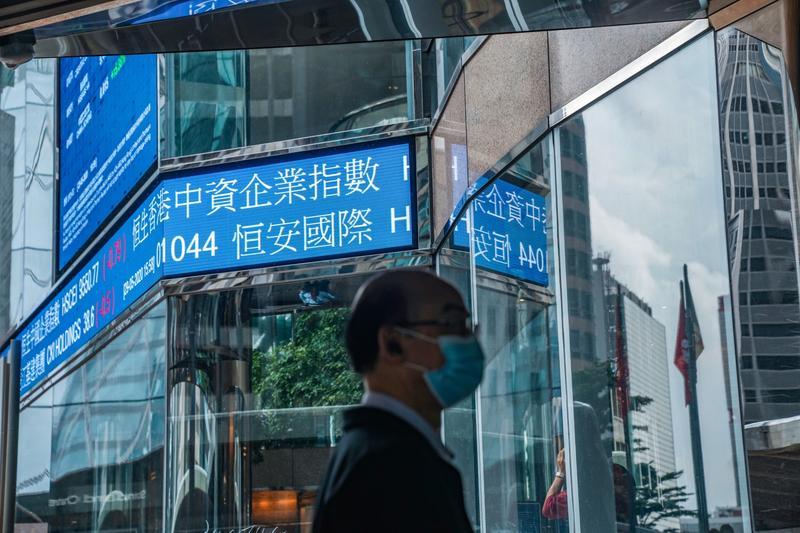 A pedestrian wearing a protective mask walks past a stock ticker at the Exchange Square complex, which houses the Hong Kong Stock Exchange, in Hong Kong, May 29, 2020. (PHOTO / BLOOMBERG)
A pedestrian wearing a protective mask walks past a stock ticker at the Exchange Square complex, which houses the Hong Kong Stock Exchange, in Hong Kong, May 29, 2020. (PHOTO / BLOOMBERG)
A top bet this year on Hong Kong’s stock exchange is the Hong Kong stock exchange.
Hong Kong Exchanges & Clearing Ltd. has surged 46 percent in 2020, making it the second-biggest gainer in the benchmark Hang Seng Index.
The jump to a record has been stoked by a flood of share listings by high-profile mainland companies. The firms are turning to the bourse amid rising political tension with the US, and increased scrutiny of mainland firms.
The jump to a record has been stoked by a flood of share listings by high-profile mainland companies. The firms are turning to the bourse amid rising political tension with the US
HKEX’s listing funds rose 49 percent in the three months through June. It’s now poised to welcome another mega deal by financial technology giant Ant Group. The main source of revenue, trading, is up about 50 percent from last year after the recent big share deals.
The rush to the exchange “is arguably the most certain story in an uncertain time,” said Hao Hong, chief strategist at Bocom International in Hong Kong.
Offset by lower income from derivatives and commodities, the exchange is anticipated to post about a 6 percent rise in profit in its second-quarter earnings report on Wednesday, according to Bloomberg Intelligence senior analyst Sharnie Wong.
Since early June, flows from mainland bourses in a trading link has doubled from a year earlier. The dynamic is likely to sustain gains for the bourse until at least the US November election, Hong said.
ALSO READ: HK to play bigger role as a link amid geopolitical changes

A feared capital flight out of Hong Kong has yet to materialize. Many high-net worth investors have been opening accounts abroad, but are as of now sticking it out, betting central government support will deliver gains and stability back to the protest-rocked city. The city’s financial chief, Paul Chan, has sought to reassure that businesses will continue as usual, urging the industry not to worry about any curbs on such things as short selling and writing research reports.
Unicorn search
But Hong Kong also has competition from mainland bourses. Authorities are opening their financial markets and keen on building up local exchanges, making it easier to list in Shanghai and Shenzhen, posing a challenge.
A feared capital flight out of Hong Kong has yet to materialize. Many high-net worth investors have been opening accounts abroad, but are as of now sticking it out, betting central government support will deliver gains
Ant Group is pulling off a dual listing, with the largest part of cash expected to be raised in Shanghai. The bourse scored a big coup last year in luring the tech behemoth to do a US$13 billion dual listing in Hong Kong, adding to one in New York.
While only a year old, Shanghai’s STAR Board has attracted a number of Hong Kong-listed companies to raise or seek to cash, among them Semiconductor Manufacturing International Corp. and Geely Automobile Holdings Ltd. SenseTime Group Ltd., China’s largest artificial intelligence company, is also exploring a dual listing in Hong Kong and mainland as it closes in on US$1.5 billion of pre-IPO financing.
READ MORE: HK traders love mainland firms raising funds at home
For the time being, Hong Kong has an advantage with an abundance of derivatives for hedging not available on the mainland as well as longer trading hours. Alex Wong, asset management director at Ample Capital Ltd., said that means investors will likely favor Hong Kong over Shanghai when Ant is listed in both venues.
But the biggest advantage for the special administrative region remains China’s capital controls.
“Mainland bourses obviously wanted to have a share in the game, but as long as capital controls are in place Hong Kong and the HKEX remained very hard to replace,” said Hong.


